‘Grapes of God,’ smitten: The transformation of a small Catholic village in Yunnan
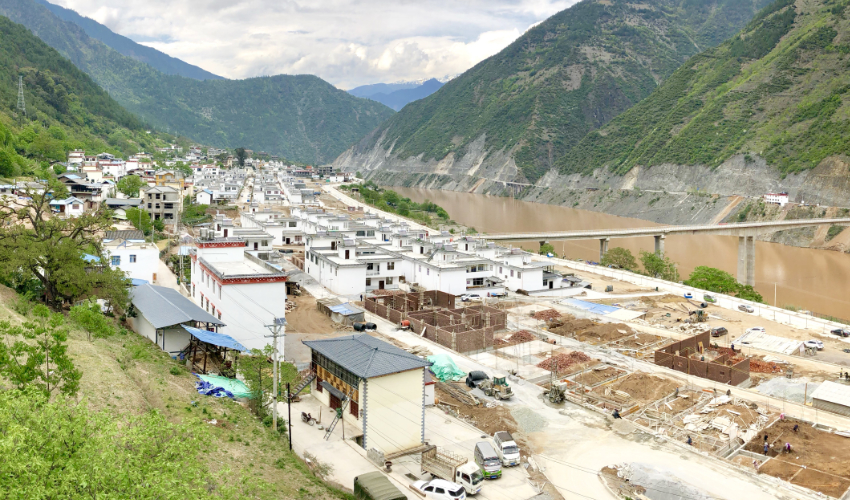
Cizhong was a thriving, wine-producing village until a new dam downriver changed everything. “Our land is gone,” said a guesthouse owner.

“Jesus came as a light into the darkness,” Father Yao told me at a candlelight mass the night before Easter. His Tibetan parishioners filled the Cizhong Catholic church and affixed their candles to the top of the pews with drips of hot wax. Their voices — some deep, some shrill — droned over a minor scale, reverent yet haunting: Catholic liturgy with Tibetan characteristics.
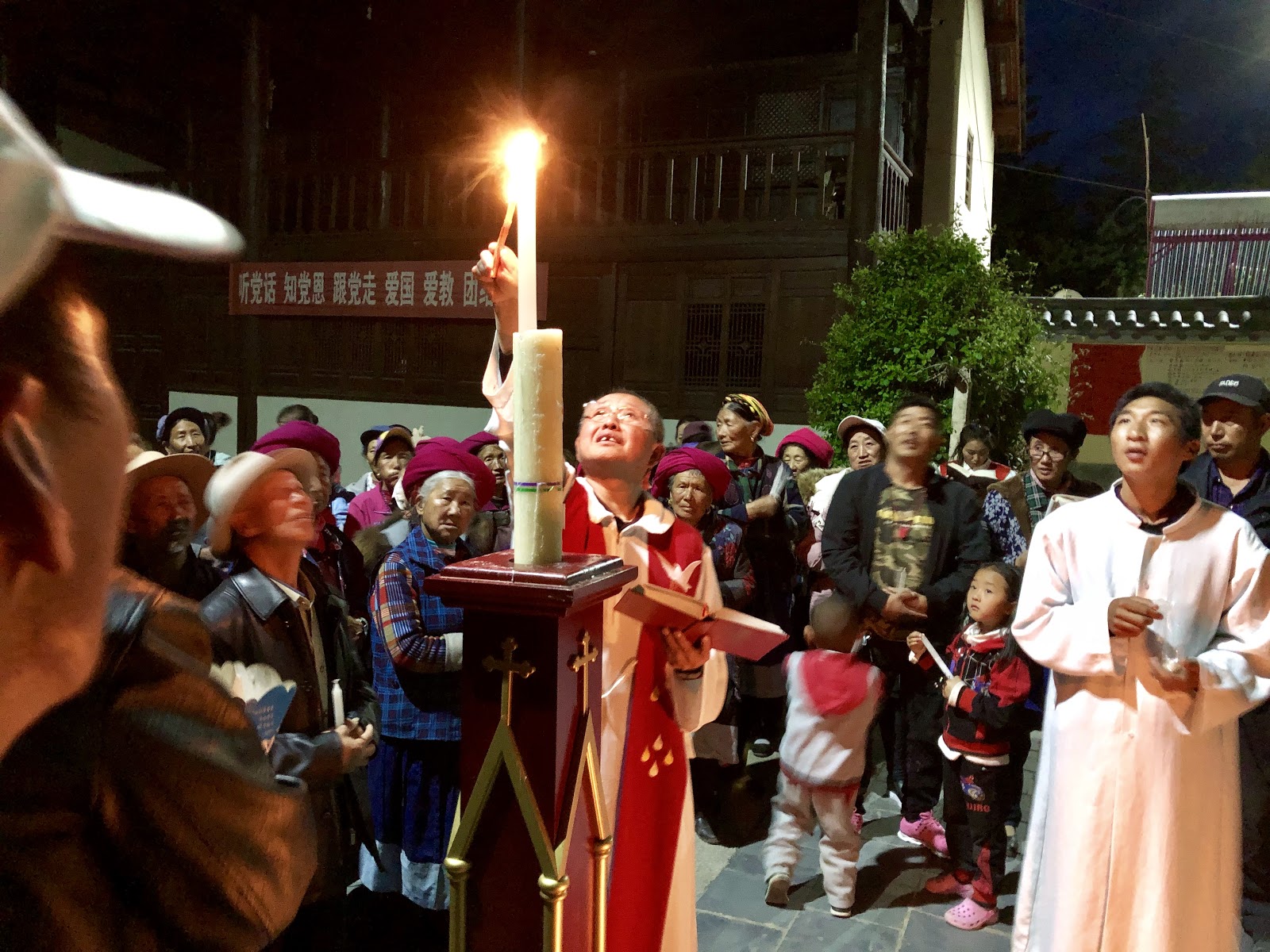

Cizhong village, located in northern Yunnan Province near the border of Sichuan and Tibet, is known for both its unusual French Catholic heritage and a historic wine industry. Locals fondly recall a story about the village’s history with wine and a recent industry boom: French missionaries came to the region in the 1800s and brought with them rose honey grapes for communion. Those grapes were wiped out in France by a blight in 1860, and it was not until the 1990s that a French sommelier rediscovered the world’s last acre of rose honey grapes on the grounds of the Cizhong Catholic church. Two years ago, villagers were extremely optimistic about the local wine industry, telling media that they were finding larger and larger profits in growing grapes.
But the reality I discovered in the village was vastly different from the description of villagers’ optimism two years ago. Thanks to a new dam downriver, Cizhong’s rural idyll has been destroyed, and with it, residents’ means of providing for themselves. “Our land is gone,” Yi Xi, a local guesthouse owner, told me. “This used to be a beautiful village, now we have nothing.”
About 10 miles downriver from Cizhong is the Wunonglong Dam, completed just last year and one of more than 20 dams already operational or in the pipeline on the China side of the Mekong River. It sells its electricity to power-hungry Shenzhen, home of the tech giants Huawei and Tencent. It raised the water level more than 60 meters and flooded numerous villages upriver, though Cizhong wasn’t one of them.
Cizhong was flooded, instead, by villagers.

The people of all those flooded villages needed somewhere to move, and flat land in the Mekong’s narrow gorge is scarce. Cizhong is an exception. The small village is situated on a long narrow plain on the bank of the Mekong, surrounded by rice paddies four or five times its size — at least until the relocations began. Now, Cizhong’s entire plain of fertile farmland has been paved over and converted into residential plots and roads (2015-2019 time lapse here). Though villagers were compensated, compensation schemes do not take into account both the value of the land and loss of future income. Residents’ rice fields and vineyards are now gone forever, and along with them, their means of production. They can no longer grow rice to eat or wine to sell and, perhaps worst of all, tourism dollars have disappeared.
“No one stays in Cizhong anymore,” Ciren Quzong told me over a morning pot of yak butter tea. “They just take photos of the Catholic church and leave.” Ciren, who is a Tibetan Buddhist, and her husband, a member of the Naxi ethnic minority, own one of the only traditional wood structures remaining in the village that they’ve turned into a guesthouse and small café. I was the only customer, slowly sipping the creamy salted drink as I browsed thangka paintings, a poster of Potala Palace in Tibet, and photographs of the Panchen Lama. Among them, a poster of President Xi Jinping seemed out of place.
As we chatted, a group of Europeans rolled into the village plaza and dismounted their motorcycles. They peeked into the church, strolled through the vineyard, and rumbled off again. They didn’t even take any wine for the road — only photos. Visitor numbers may be up thanks to a new highway, but tourist dollars are down. Cizhong is now just a stopping point on the way to somewhere else; it has lost its je ne sais quoi. “I have no idea what we’ll do,” Ciren laments.
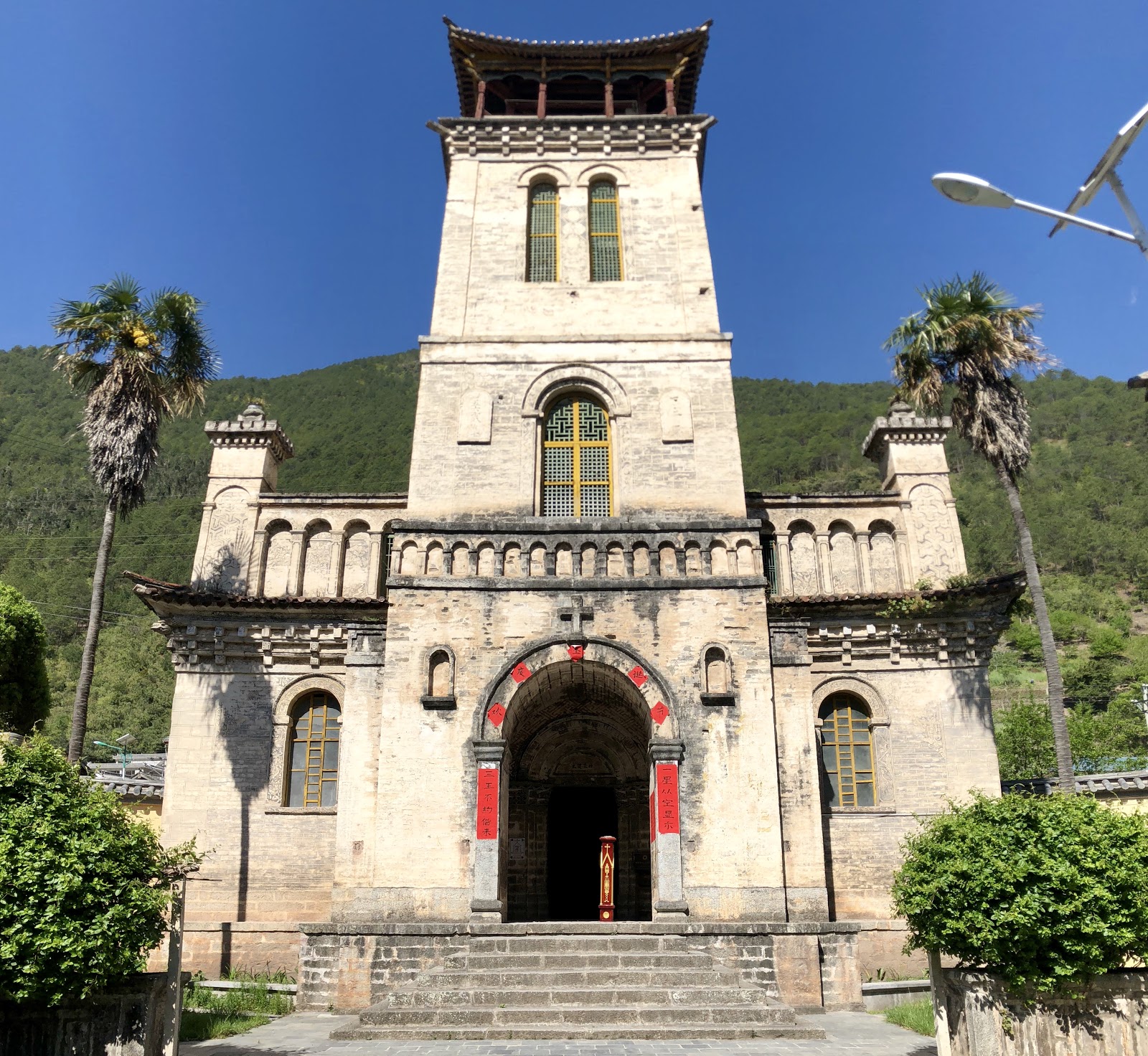
Wu Hongxing shares Ciren’s fears. He runs a tour and trekking business based in Cizhong and sells wine from a shop right next to the church. A poster on the wall advertises his different tours, and I commented on a photo of him hugging his pack mule. “Last year I sold Ranmu because numbers are so low,” Hongxing responded. Before the relocation project, he used to run about 20 treks per year, but now he’s down to less than half that. He saw me cringe. “It’s ok,” he reassured me, “I can buy a new Ranmu someday.”
We chatted over glass mugs of his family’s rose honey wine. His father, Wu Gongdi, was the first in Cizhong to begin producing wine again in the 1990s. He started with vine cuttings from the church vineyard and learned from his aunt, a nun who had served with the foreign missionaries. Now, only two vineyards in Cizhong — his and the one on the church grounds — still grow the original rose honey cultivar, Hongxing told me.
He sniffed and sipped from each mug before handing them to me with my undiscerning palate. “It’s not not wine,” I thought as I sipped the first, recalling the tasting notes of a wine aficionado in Washington, D.C., to whom I had presented a bottle of Yunnan Red. The second pour was from late harvest grapes, left longer on the vine to dehydrate and concentrate sugars. I detected notes of grape Jolly Rancher and Dimetapp; it was full-bodied with a syrupy finish. I liked it.
Hongxing is worried about the survival of honey rose and his vineyard in the long term. The water’s level has risen to just below the village and now moves so slowly I couldn’t tell which direction was upriver. That will affect the moisture level and temperature, Hongxing said, which will alter the air, soil, and character of the grapes he grows. The changes are gradual, and he expects them to hit in full in about three years. He looked at me completely at a loss. Our land is ruined, our crops are ruined, even our scenery is ruined, he said. Besides the church, there’s nothing left for tourists to enjoy. What more do we have?

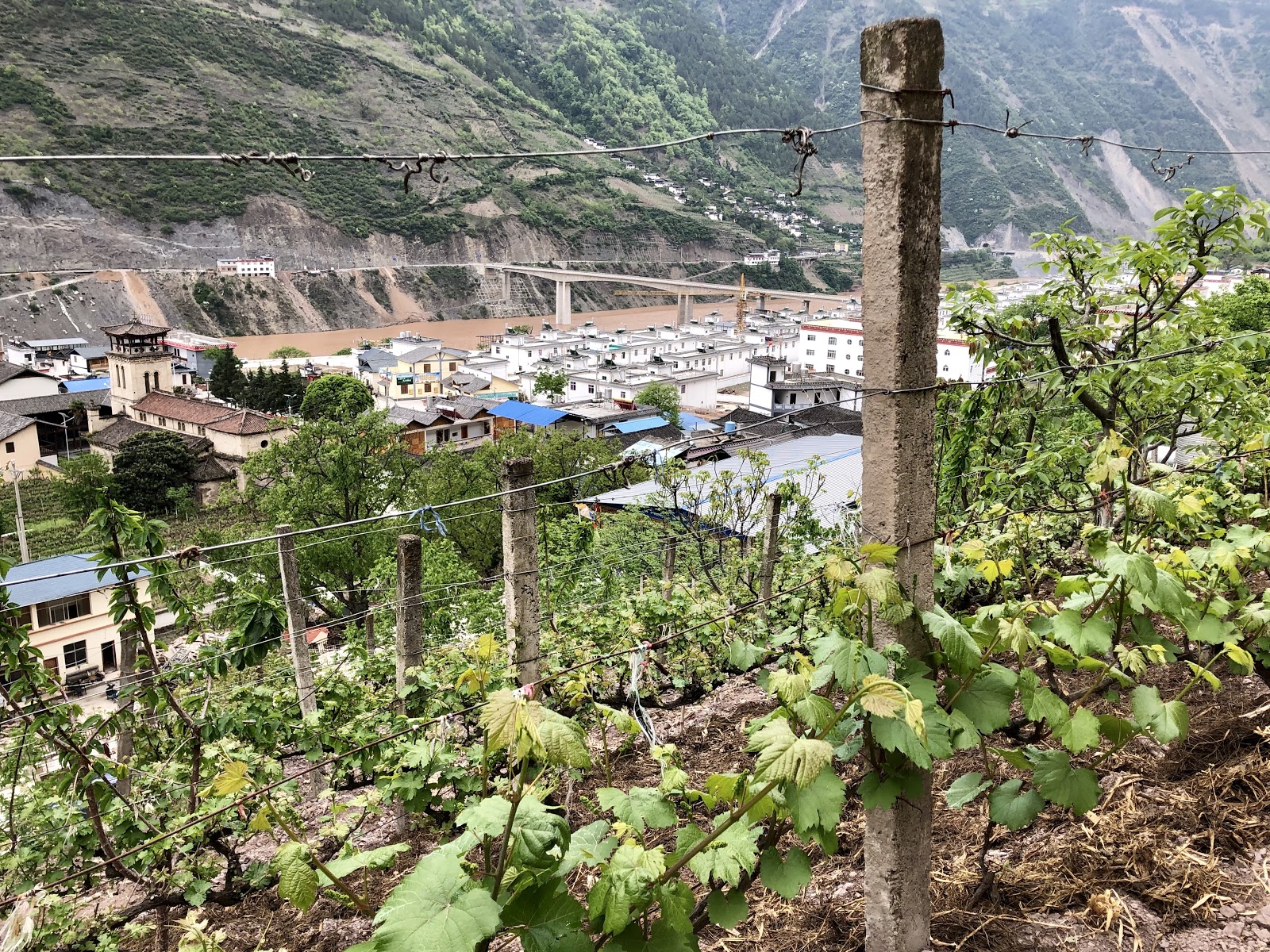
But not everyone is so pessimistic. “Life and transportation are so convenient now,” a man, surnamed Zhang, told me with satisfaction. “Our national policy is good.” Zhang moved to Cizhong in 1953 and bought a small parcel of land for 2,500 yuan, equivalent to the buying power of roughly $10,000 in today’s dollars. With Cizhong’s recent construction boom, he was able to sell his farmland to the government and now gets disbursements of 500 yuan ($75) each month. For all his farm work, he used to make just 5,000 yuan ($750) each year. Now he does nothing and the money rolls in. “These houses used to be made of mud, now mine is four stories. There are 24 people in our family and we own eight cars. Almost everyone in the village has one now.” Zhang is pleased with the turn of events: he has a new house, monthly disbursements, and health care subsidies. Who needs farmland?
One man mixing concrete in front of his new house had been relocated from Huafengping, a nearby village on the dam’s floodplain. But his 65-year old mother refuses to move. “They’ll probably make her,” he told me with resignation in his voice. “But we can’t do anything about it. That’s just the way it is.”
At the Catholic Church, throughout the candlelight mass, phones rang, kids played tag, and battery-depleted smoke alarms beeped incessantly above the droning chants. Only one man set his coat on fire. After administering the Eucharist, Father Yao pronounced a blessing over ears of corn and yogurt that parishioners had placed at the altar, then everyone ushered out into the courtyard where a red banner hangs:
Listen to the Party. Be grateful for the Party. Follow the Party
听党话,知党恩,跟党走 (tīng dǎng huà, zhī dǎng ēn, gēn dǎng zǒu)
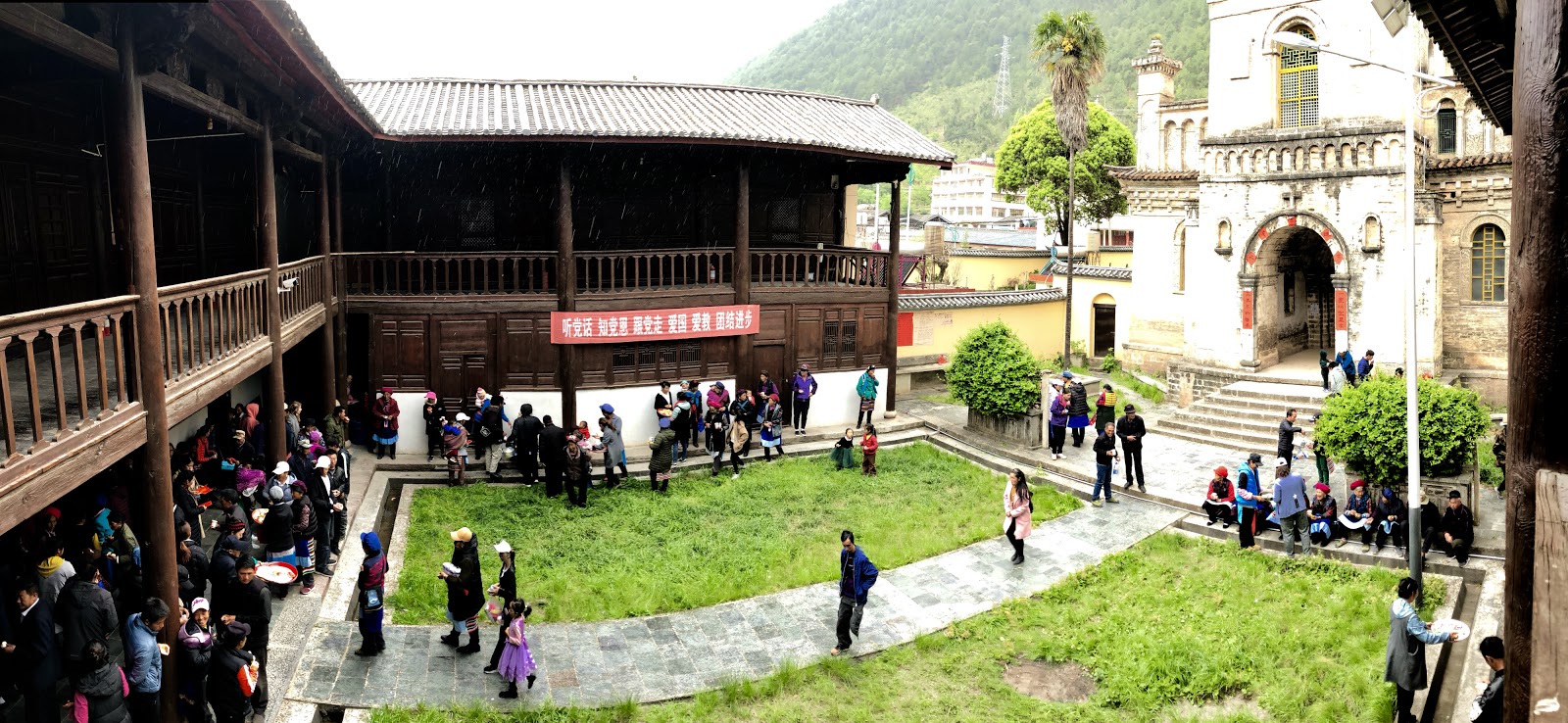
In Cizhong, those are your three options. Many in their twilight years are happy with their new houses and content to live month-to-month on government disbursements. But others are worried. In one fell swoop, the Party has taken their land, destroyed their means of production, and ruined their alternative income streams, exchanging them for 15 years of monthly installments and promises of a great rejuvenation of the Chinese people. The locals had no say in the process and no recourse, like candles blown by the state-planned wind. Listen, be grateful, follow.






